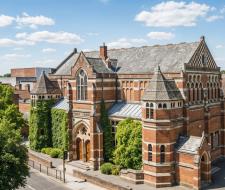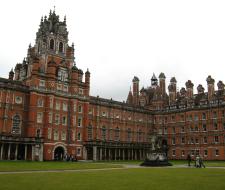Study international relations in England UK - 41 institutions
-
 75% of our A-Level students achieved A*-A in 2022
75% of our A-Level students achieved A*-A in 2022 United KingdomCanterburyCurrently watching: 6from 11450.00 £ / term
United KingdomCanterburyCurrently watching: 6from 11450.00 £ / term -
 In 2020 - 70.5% of A Level students achieved A* - A
In 2020 - 70.5% of A Level students achieved A* - A United KingdomCoventryCurrently watching: 8from 12818.00 £ / term
United KingdomCoventryCurrently watching: 8from 12818.00 £ / term -
 All students holding Oxbridge places met their offers
All students holding Oxbridge places met their offers United KingdomLondonCurrently watching: 6from 15500.00 £ / term
United KingdomLondonCurrently watching: 6from 15500.00 £ / term -
 from 19800.00 £ / term
from 19800.00 £ / term -
 #45 in the world
#45 in the world United KingdomLondonCurrently watching: 6from 11400.00 £ / term
United KingdomLondonCurrently watching: 6from 11400.00 £ / term -
 Ranked 43rd in the UK
Ranked 43rd in the UK United KingdomLondonCurrently watching: 6from 5900.00 £ / term
United KingdomLondonCurrently watching: 6from 5900.00 £ / term -
 from 5750.00 £ / term
from 5750.00 £ / term -
 In 2023, the average IB score was 38.6 points
In 2023, the average IB score was 38.6 points United KingdomReadingCurrently watching: 6from 10200.00 £ / term
United KingdomReadingCurrently watching: 6from 10200.00 £ / term -
 Ashbourne students consistently achieve excellent A level results, 53% A*A in 2023, far ex
Ashbourne students consistently achieve excellent A level results, 53% A*A in 2023, far ex United KingdomLondonCurrently watching: 6from 10250.00 £ / term
United KingdomLondonCurrently watching: 6from 10250.00 £ / term -
 from 4300.00 £ / term
from 4300.00 £ / term
World politics affects the lives of the entire population of the world, so studying international relations in the UK is a great way to gain a deeper understanding of global issues, develop the ability to think critically about regional, national and international politics. International relations is the study of a world made up of sovereign states that do not recognize any "higher authority." Students explore the nature of the changing relationship between states and non-state actors, addressing the most pressing and important issues from all corners of the globe.
Schools with the study of international relations in England rank at the top of the rankings for the quality of policy and international studies studies. The lectures are delivered by cutting-edge specialists – experts in their field, who will prepare students for various career paths in the private, public and non-profit sectors within the framework of international relations. Students gain the knowledge and skills to make a difference in the world, explore policy ideas, systems, and processes, learn to question and challenge arguments, collect data, develop knowledge, construct arguments, and communicate their findings in a variety of ways. Each course will offer a wide range of modules to help tailor the programme to your own interests and goals.
Studying international relations at universities in England for international students will allow you to expertly understand:
- Problems and power struggles in today's globalized world,
- Cooperation of States and Societies,
- World Politics.
Students will get to know the key players, organizations and policies that underpin the global economy, learn how systems affect refugees and protesters, and the climate emergency.
Alternative destinations
Studying International Relations in the UK: Structure and Content of Programmes
Bachelor's programs usually last 3-4 years. Popular destinations:
- History/International Relations,
- Geography/International Relations,
- International Relations and Politics,
- Politics and International Relations,
- Anthropology/International Relations,
- Criminology and International Relations,
- Communication, Mass Media,
- Bachelor of Politics and International Relations,
- Business Management and International Relations,
- Economics, Politics and International Relations.
Master's programs take 1-2 years:
- International Relations,
- International security,
- Gender and social relations.
In the first year of study, the Faculty of International Relations in the UK builds a solid foundation of knowledge through core modules: students will get acquainted with theoretical approaches to understanding the dynamics of global politics and learn key concepts:
- Sovereignty
- Balance of power,
- International law
- Security
- Globalization.
Additionally, modules of personal choice are selected, for example:
- Media Studies,
- Political communication and others.
The curriculum includes traditional lectures and small group seminars where topics covered are discussed. Students will learn important skills:
- Generalization and analysis of information,
- Development and criticism of arguments,
- Public speaking, etc.
Weekly runs:
- Essay
- Projects
- Presentation
- Preparation of answers to the questions of the seminar.
In the 2nd year, students explore various areas of domestic and global politics, regularly give presentations to peers and teachers, developing communication skills. The third year is dedicated to specialization – students will focus on the topics they want to study. For writing the dissertation, a topic, a question and a methodology are selected under the guidance of one of the experts of the school with the study of international relations in England. Other skills are also developed, such as writing policy briefings, research papers, or submissions to individual committees.
International Relations and Politics: Bachelor's Degree
The Bachelor's degree programme in International Relations and Policy consists of an overview of the main topics and debates. Students gain a variety of insights into key global policy issues:
- War
- Migration
- Conflicts
- The emergence of new countries,
- Global injustice.
In the International Relations programme in the UK, students will acquire useful analytical skills that allow them to identify and uncover the causes and consequences of the world's biggest problems and various political processes. Current global events – security threats, leadership transitions, the emergence of new powers, and the evolving nature of the EU – pose new challenges to governments, regions and the international system as a whole. The course examines in detail all emerging issues, in which students develop political techniques in the field of cybersecurity, security, diplomacy and emerging powers, great powers, and consider the interaction of international power, order and institutions.
The Faculty of International Relations in the UK is suitable for students from all over the world, with different initial academic and professional backgrounds, it is enriched with debate and offers deep and diverse perspectives on the topic. For example, the topics of lectures can be:
- Interaction of foreign languages with each other: Russian, Japanese, Arabic, German, Chinese, Greek, Spanish, Italian, French (+ learning these languages),
- Media Industry,
- Introduction to Development Policy,
- Language, Culture and Identity,
- Socio-political theory,
- Introduction to Global Policy,
- Modern Readings in Philosophy,
- Introduction to British Sign Language (!),
- The Age of Extreme: Europe 1918-2001,
- Introduction to Political Communication,
- English academic writing skills.
The faculty members are well-known, recognized scholars in the fields of international security, terrorism, foreign policy, and international political economy. They have expertise in many relevant topics, including secret intelligence, the global revival of religion, emerging powers, peace and conflict studies, and have strong, sometimes innovative views on many complex and evolving fields.
Studying International Relations at universities in England for international students is:
- A broad view of current issues of relations between countries,
- Strong analytical skills and theoretical thinking that allow them to conduct political analysis and understand the problems and events of various states,
- A deep understanding of the world of negotiation and diplomacy, the actions of multilateral institutions in the field of trade and security,
- A solid foundation for international careers in management, diplomacy, policymaking, and research.
International Relations and Politics: Master's Degree
The course is particularly suitable for students who are interested in contemporary world issues and have a degree in a relevant subject:
- Politics
- History
- Economics
- Sociology
- Modern languages,
- European Studies,
- International relations.
At the lectures, students study the multifaceted topic of international security, advanced prospects. The security of the world has changed dramatically in recent decades: terrorism, human and drug trafficking, territorial and sovereignty disputes have all added additional complexity to the traditional problems of state security.
Studying International Relations in the UK for international students provides an in-depth insight to:
- International security,
- Policy Research,
- Role of Europe and the European Union,
- Problems of various governments and organizations,
- Politics and its development in the modern global arena.
With knowledge of a wide range of topics, students will gain new perspectives in subject areas, such as:
- Rising powers,
- Global Governance,
- Borders in Southeast Asia,
- Biological and chemical weapons,
- US drone strikes in Pakistan.
The study of international relations and politics gives students to:
- A deep understanding of the new post-Cold War international security environment,
- Detailed knowledge of the theories and methods underlying the security of all countries,
- Ability to analyze current security issues and practices, their impact on research and policymaking,
- A solid foundation for careers in management, diplomacy, research and policy development.
Studying International Relations at Universities in England for International Students, Prospects
The study of international relations is an excellent foundation for working in organizations around the world, multinational corporations, government agencies, and analytical centers. After completing the course, students acquire in-demand skills:
- Problem solving,
- Critical analysis,
- Project management,
- Communication.
Their intercultural awareness and readiness for a career in international development, corporate social responsibility are developed.
Graduates can hold positions such as:
- Lawyer
- Expert
- Academician
- Researcher
- Research Analyst,
- Assistant Member of Parliament,
- Consultant at a defense plant,
- Anti-Money Laundering Advisor,
- Public Relations Officer,
- Assistant to the Heads at the Embassy,
- Commercial Manager in the Clean Zero Energy sector.
Studying International Relations in the UK for international students allows 2nd year students to participate in studies at one of the European universities (usually one semester). Gaining knowledge abroad improves academic experience and increases job prospects. More than 90% of graduates find a high-paying job within 15 months of graduating from the course.
